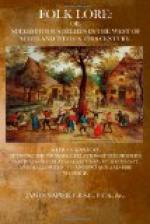Under “Superstition,” in the Encyclopaedia Metropolitana, the following definitions are given:—
1st.—Excess of scruple
or ceremony in matters of religion: idle
worship: vain reverence: a superfluous,
needless, or
ill-governed devotion.
2nd.—Any religious
observance contrary to, or not sanctioned by,
Scripture or reason.
3rd.—All belief in
supernatural agency, or in the influence of
casual occurrences, or of natural phenomena
on the destinies
of man which has no foundation in Scripture,
reason, or
experience.
4th.—All attempts to
influence the destiny of man by methods which
have no Scriptural or rational connection
with their object.
Walker’s Dictionary:—
“Unnecessary fear or scruple
in religion: religion without
morality: false religion: reverence
of beings not properly objects
of reverence: over-nicety: exactness:
too scrupulous.”
Chambers’ Dictionary:—
“A being excessive (in religion) over a thing as if in wonder or fear: excessive reverence or fear: excessive exactness in religious opinions and practice: false worship or religion: the belief in supernatural agency: belief in what is absurd without evidences: excessive religious belief.”
These dictionary meanings do not, of course, attempt to decide what should be the one only scientifically correct significance of the term, but only supply the varying senses in which the word is used in literature and in common speech, but they suffice to show that it is used by different persons with different significations, each person apparently gauging first his own position, and defining superstition as something which cannot be brought to tell against himself.
After pondering over the various renderings, it occurred to me that the following definition would embrace the whole in a few words: Religion founded on erroneous ideas of God. But when I set this definition alongside the case of an otherwise intelligent man carrying in his trousers’ pocket a raw potato as a protection against rheumatism, and alongside the case of another man carrying in his vest pocket a piece of brimstone to prevent him taking cramp in the stomach; and when I consider the case of ladies wearing earrings as a preventive against, or cure for, sore eyes; and, again, when I remembered a practice, very frequent a few years ago, of people wearing what were known as galvanic rings in the belief that these would prevent their suffering from rheumatism, I could not perceive any direct connection between such superstitious practices and religion, and the construction of a new definition was rendered necessary. The following, I think, covers the whole ground: Beliefs and practices founded upon erroneous ideas of God and nature. With this meaning the term “Superstition” is employed in the following pages, and if the definition




